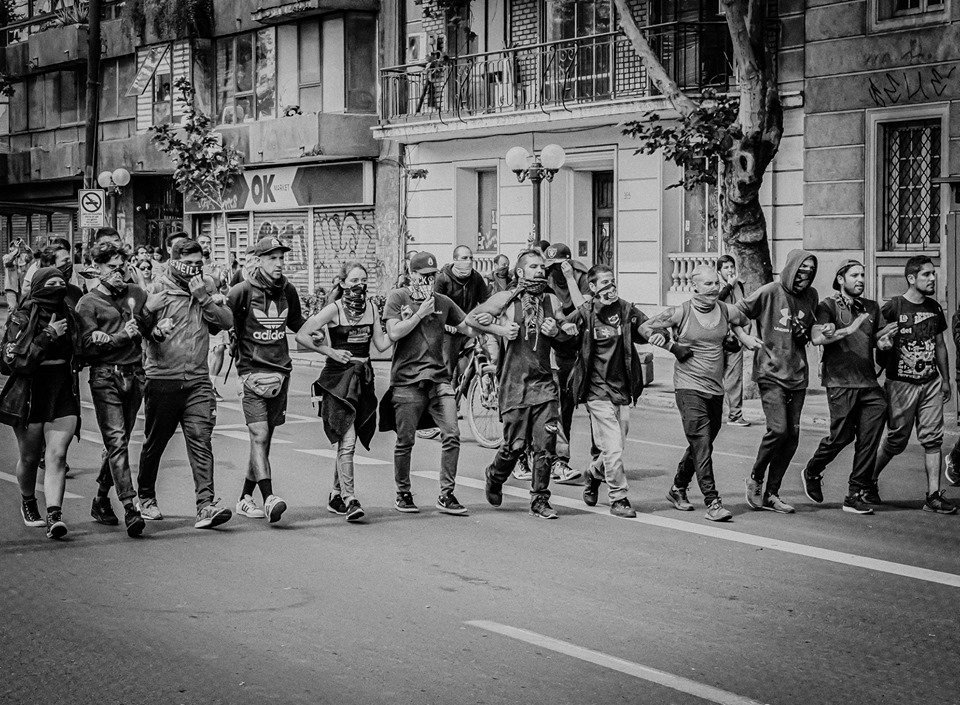The Gilets Jaunes, Hong Kong, Ecuador, Haiti, Egypt, Algeria, Guinea, Lebanon, Catalonia, and now Chile, these events mark the beginning of a new sequence of revolts.
We (Lundi Matin*) have received this written communiqué jointly from Santiago and Paris and hereby forwarded it.
Those certain Jemande (Quidams), another blow more…
In practice. Even the smallest incident that could be attributed to chance cannot happen without questioning the whole situation. As beautiful as a chance encounter, happening on a map of the world, with the bulls and the revolting crowd, the riots of Santiago crystallized in a few hours into a reflection of all the challenges and dispositions of our epoch. On the ground: the ever-increasing importance of circulation (goods and people), which makes every new price increase a question of survival. On the side of power: the shabby security infrastructures that form the inevitable backdrop of cybernetic capitalism. And when new abomination laws have not yet been enacted, there is still the possibility of falling back on old reflexes. Specifically, the state of emergency and an army that has not changed since Pinochet. Finally, on our side: the relentless topicality of the strategic tendency, the irrepressible impulse of a desire for a lasting and profound uprising, the conscious efforts of some minds, of some bodies, which support this movement on which our future depends. Finally, the courage of a few thousand high school students who alone knew how to call an entire capital city to revolt.
To be untamed. “No hunter has ever known what to do with our brutality, because it cannot be put on any chain, reduced to the size of any cage, because it always escapes, always follows its path, is called, appears and disappears, slams, as pain exists, because it is pain. And pain is our story.”
This story, painfully ignited today, cries, mourns, flies over the gates of the city, plunders the enemy city, the imprisoned city, this city with its old and oh so respectable colonial names. The city of the fearful, the city of those who played Pharaoh. But no. We will not submit. No one, neither in Santiago nor in Chile nor anywhere else, accepts to pay with his life the madness of their wealth”.
We are. We would never have thought of living in a world where we could seriously consider writing a solemn sentence, one of those good old sentences that we thought were finally locked up in the curiosity store of history, one of those calls worthy of Marx to the “Workers of all countries, unite! And yet, uprising after uprising, city after city, country after country, week after week, it is the conviction of living a common uprising that seizes us. The crisis of governance is general: those certain Jemande (Quidams) of all metropolises, unite.
Collapse. If those who have not retreated in front of 3000 dead and missing people without hesitation tortured 40,000 more people mobilise the army again after a simple riot, we learn in the same week that China partly forbids the sale of black clothes. The empire trembles and the collapse of capitalism is perhaps closer than the end of the world.
Epoch. Since 1968 and the destruction of its heritage under the neoliberal counter-reaction, the events have never seemed so open. The yellow West, Hong Kong, Ecuador, Haiti, Egypt, Guinea, Lebanon, Catalonia, Honduras and now Chile mark the opening of a new sequence. As reformist as the demands may be, we are at a crossroads. A class that is still anonymous and confusedly aware of it is beginning to understand that our destinies are linked. The current ecological catastrophe is the scene of a decision between the “Night of Surveillance” and the “Glory of the Return of the World”.
Quidams, again an attempt to be comprehensively revolutionary. We call for unviolent (!) disobedience in the cities of the world.
Santiago de Chile – Paris, 19 October 2019
This text appeared on 21.10.2019 on Lundi Matin. Unfortunately it was not possible for the translator to do justice to the full beauty, the poetry of the text, but at the same time nobody else could be found to bring these important lines to the attention of the German-speaking readership. This is how they have to live with this approach.
Sebastian Lotzer, 23.10.2019

